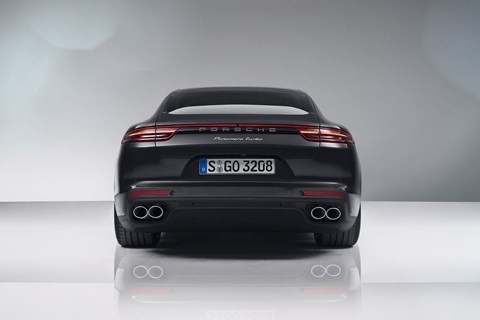► First look at Porsche’s Panamera II
► New engines, new platform, new tech
► 542bhp V8 Turbo tops the range
The second-generation Porsche Panamera has come out the blocks fast, with a claimed Nurburgring lap record for a sports saloon. The 542bhp Turbo model, which costs €153,000 on the Continent, scored a 7min 38sec Nordschleife time – the same as a 997 GT3’s.
The design is less bulbous than the 2009 original’s but still recognisably Panamera, the new engine range is faster and more economical (of course), and the most pronounced improvement comes inside with a much more high-tech cockpit influenced by the 918 supercar’s. ‘The new Panamera is a completely redesigned vehicle,’ said Porsche chief Oliver Blume, unveiling the car in Berlin on 28 June. ‘The second generation has become more sporty, more comfortable and more beautiful. It’s even more of a Porsche.’
See the new Panam at the 2016 Paris motor show.
I’m an England player: how quickly can it get me out of Europe?
Very quickly indeed: the new Panamera Turbo, with its bi-turbo 4.0-litre V8, can accelerate from zero to 62mph in 3.8sec, or 3.6sec with the Sport Chrono pack. Top speed is a phenomenal 190mph. The engines are redesigned and in the Turbo’s case downsized, with the turbos mounted in the V between the cylinder banks; the upshot is a more compact engine which can be mounted lower in the nose (improving the design and centre of gravity), and with shorter intake paths sharpening throttle response.
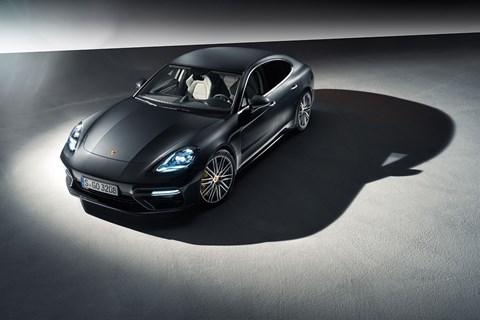
The 542bhp Turbo has an extra 29hp and 52lb ft compared with its predecessor. One cylinder bank can shut down at low loads, enabling the engine to run as a four-cylinder and reducing consumption by up to 30%. The Turbo returns around 30mpg, and emits up to 214g/km of CO2. It’s fitter than an Icelandic defender too, with kerbweight dipping to a still-chunky 1980kg.
What other variants are there at launch?
The base car is the €113,000 Porsche Panamera 4S with its blown 2.9-litre V6, while the launch diesel is the €116,000 4S Diesel. That ‘4’ signifies a new development: this time the diesel is offered with four-wheel drive. And it’s the V8 bi-turbo diesel from Audi’s SQ7, though here without the additional electric kompressor.
Peak power is 416bhp, while max torque is a volcanic 627lb ft, coming on stream at just 1000rpm. The result is the world’s fastest diesel production car, with a v-max of 177mph, and 0-62mph in 4.5sec. Officially, the D4S will return 41mpg and puff out 178g/km of carbon dioxide.
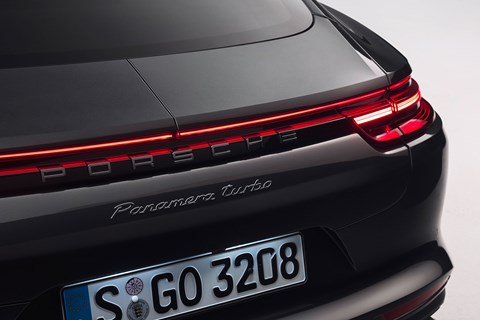
And the 434bhp petrol 4S? The stat fest is: 4.4sec 0-62mph, 180mph, 34.4mpg – up 11% – and emissions of up to 186g/km. All are helped by an all-new, eight-speed PDK twin-clutch auto box.
Fast is to be expected. Any surprises on the new 2016 Panamera?
The cabin certainly moves the game on. Footballers will recognise the style of the slanted centre console from their 918s; it has a black finish and no discernible buttons, like your smartphone’s screen. Even the louvres on the central air vents are controlled by touch-sensitive sliders.
A 12.3-inch screen dominates the centre dash, while two more TFT screens are in the binnacle, either side of the analogue tacho.
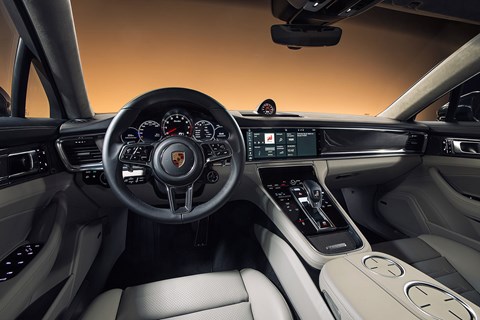
Apple CarPlay, Porsche Connect online functions, a more natural voice control system and night vision are also plumbed in: it’s a tech geek’s paradise. This Porsche will also pilot you, thanks to the InnoDrive system. Similar to the Audi A4’s autopilot, it combines navigation info such as speed limits and topographical information with radar and sensor ‘vision’, to calculate optimal acceleration, deceleration and gear selection to virtually chauffeur you.
A Porsche driving itself – isn’t that rather missing the point?
True. But this G2 Panamera is based on Porsche’s new MSB architecture, which will also underpin other group models including next-generation Bentleys. It’s a bit of a techfest in every sense. Base cars ride on steel springs, but air suspension is available with electronic damper control (Porsche Active Suspension Management).
The chassis alphabet soup also includes the PDCC Sport control system to counter body roll and PTV Plus torque vectoring to put the power down cleanly. Another new Panamera development is the introduction of rear-axle steering from the 911, to sharpen turn-in.
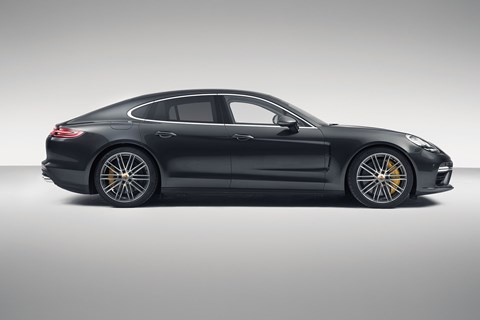
A brace of hybrids are in the works: expect one eco-biased fuel sipper and a more outrageous, performance-oriented Panamera Hybrid too.
How big is it?
At just over 5m-long, the G2 is 35mm longer than before, and a scant 5mm wider and taller. The standard wheelbase is bigger too, the rear roofline reduced by 20mm to eliminate that hunchback look, and the front wheels shifted forward to improve the proportions.
The design is much more handsome, but it still looks like the front and rear ends of a 911 grafted onto a limousine’s cockpit. Wheel sizes span 19 to 21 inches. The order book is open now, with right-hand drive deliveries due in autumn 2016.
We’ve already ridden in the new G2-generation Panamera at its final sign-off – click here to read Georg Kacher’s thoughts from the passenger seat of the new Panam.
